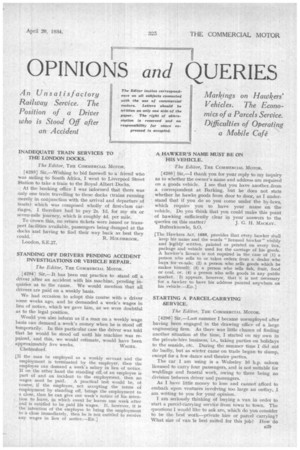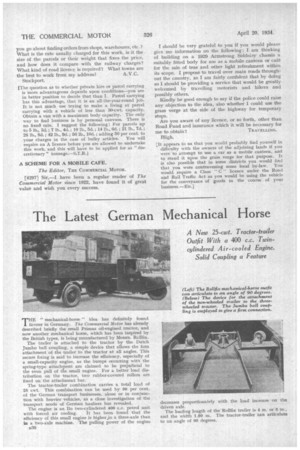OPINIONS and QUERIES
Page 43

Page 44

If you've noticed an error in this article please click here to report it so we can fix it.
INADEQUATE TRAIN SERVICES TO THE LONDON DOCKS.
The Editor, THE COMMERCIAL MOTOR.
[4293] Sir,—Wishing to bid farewell to a friend who was sailing to South Africa, I went to Liverpool Street Station to take a train to the Royal Albert Docks.
At the booking office I was informed that there was only one train travelling to these docks (trains running merely in conjunction with the arrival and departure of boats) which was composed wholly of first-class carriages. I therefore had to pay 2s. id. for my six or seven-mile journey, which is roughly 4d, per mile.
To crown this, no return tickets were issued or transport facilities available, passengers being dumped at the docks and having to find their way back as best they could. R. HOLDBROOK. London, S.E.27.
STANDING OFF DRIVERS PENDING ACCIDENT INVESTIGATIONS OR VEHICLE REPAIR.
The Editor, THE COMMERCIAL MOTOR.
[4294] Sir,----It has been our practice to stand off a driver after an accident with his machine, pending inquiries as to the cause. We would mention that all drivers are paid on a weekly basis.
We had occasion to adopt this course with a driver some weeks ago, and he demanded a week's wages in lieu of notice, which we gave him, as we were doubtful as to the legal position.
Would you also inform us if a man on a weekly wage basis can demand a week's money when he is stood off temporarily. In this particular case the driver was told that he would be stood off until his machine was repaired, and this, we would estimate, would have been approximately five weeks. WAGES. Chelmsford.
[If the man be employed as a weekly servant and the employment is terminated by the employer, then the employee can demand a week's salary in lieu of notice. If on the other hand the standing off, of an employee is part of and an incident to the employment, then no
wages need be paid. A practical test would be, of course, if the employee, not accepting the terms of employment by standing off, brings the employment to a close, then he can give one week's notice of his intention to leave, in which event he leaves one week after and is entitled to be paid his wages. If, however, it is the intention of the employee to bring the employment to a close immediately, then he is not entitled to receive any wages in lieu of notice.—En.]
A HAWKER'S NAME MUST BE ON HIS VEHICLE.
The Editor, THE COMMERCIAL MOTOR.
[4295] Sir,—I thank you for your reply to my inquiry as to whether the owner's name and address are required on a goods vehicle. I see that you have another from a correspondent at Barking, but hedoes not state whether he hawks goods from door to door, as I understand that if you do so you come under the by-laws, which require you to have your name on the vehicle. Do you think that you could make this point of hawking sufficiently clear in your answers to the queries on this matter? J. G. H. MACKAY. Butterknowle, S.O.
[The Hawkers Act, 1888, provides that eery hawker shall keep his name and the words "licensed hawker" visibly and legibly written, painted or printed on every box, package and vehicle used for the carriage of his goods. A hawker's licence is not required iu the case of (1) a person who sells to or takes orders from a dealer who buys for re-sale; (2) a person who sells goods which be makes himself; (3) a person who sells fish, fruit, food or coal, or, (4) a person who sells goods in any public market. It appears, however, that it is not necessary for a hawker to have his address painted anywhere on his vehicle.—En.]
STARTING A PARCEL-CARRYING SERVICE.
The Editor, THE COMMERCIAL MOTOR.
[4296] Sir,—Last summer I became unemployed after having been engaged in the drawing office of a large engineering firm. As there was little chance of finding another situation at the time, I started on my own in the private-hire business, i.e., taking parties on holidays to the seaside, etc. During the summer time I did not dobadly, but as winter came on trade began to slump, except for a few dance and theatre parties.
The car I am using is a Wolseley TIM h.p. saloon licensed to carry four passengers, and is not suitable for weddings and funeral work, owing to there being no division between driver and passengers.
As I have little money to lose and cannot afford to embark upon ventures involving too large an outlay, .1 am writing to you for your opinion.
I am seriously thinking of buying a van in order to start a parcel-carrying service from town to town. The questions I would like to ask are, whinh do you consider to be the best' work—private hire or parcel carrying? What size of van 'is best suited for this job? How do you go about finding orders from shops, warehouses, etc. ? What is the rate usually cha rged for this work, is it the size of the parcels or their weight that fixes the price, and how does it compare with the railway charges? What kind of road licence is required? What towns are the best to work from my address? A.V.C. Stockport.
[The question as to whether private hire or parcel carrying is more advantageous depends upon conditions—you are in better position to decide that than I. Parcel carrying has this advantage, that it is an all-the-year-round job. It is not much use trying to make a living at parcel carrying with a vehicle of less than 30-cwt. capacity. Obtain a van with a maximum body capacity. The only way to find business is by personal canvass. There is no fixed rate. I suggest the following : For parcels up to 5 lb., 3d. ; 7 lb., 4d.; 10 lb., 5d. ; 14 lb., 43c1. ; 21 lb., 7d.; 28 lb., 8d. ; 42 lb., 9d. ; 56 lb., 10d. ; adding 50 per cent. to your charges in the case of bulky articles. You will require an A licence before you are allowed to undertake this work, and this will have to be applied for as " discretionary" tonnage.—S.T.R. J
A SCHEME FOR A MOBILE CAFE.
The Editor, THE COMMERCIAL MOTOR.
[4297] Sir,—I have been a regular reader of The Commercial Motor since 1922, have found it of great value and wish you every success.
I should be very grateful to you if you would please give me information on the following : I am thinking of building on a 1929 Armstrong Siddelay chassis a suitably fitted body for use as a mobile canteen or café for the sale of teas and other light refreshment within its scope. I propose to travel over main roads throughout the country, as I am fairly confident that by doing so I should be providing a service that would be greatly welcomed by travelling motorists and hikers and possibly others.
Kindly be good enough to say if the police could raise any objection to the idea, also whether I could use the grass verge at the side of the highway for temporary stops.
Are you aware of any licence, or so forth, other than Road Fund and insurance which it will be necessary for me to obtain? TRAVELLING. Bligh.
[It appears to us that you would probably find yourself in difficulty with the owners of the adjoining lands if you were to attempt to use a car as a mobile canteen,. and to stand it upon the grass verge for that purpose. It is also possible that in some districts you would find that you were contravening some local by-law. You would require a Class " C " licence under the Road and Rail Traffic Act as you would be using the vehicle for the conveyance of goods in the course of your business.—Bo.]




























































































